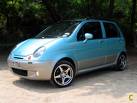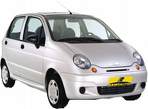|
|
|---|
|
American Politics Journal Atrios Barry Crimmins Betty Bowers Buzzflash Consortium News Daily Howler Daily Kos Democatic Underground Disinfotainment Today Evil GOP Bastards Faux News Channel Greg Palast The Hollywood Liberal Internet Weekly Jesus General Joe Conason Josh Marshall Liberal Oasis Make Them Accountable Mark Morford Mike Malloy Political Humor - About.com Political Wire Randi Rhodes Rude Pundit Smirking Chimp Take Back the Media Whitehouse.org More Links |
Subject: Life in China
I've read an estimate that by the year 2010 there
will be more cars in China than in the US.
That is to say roughly 300 million. China
is a country whose land mass is roughly that of the
United States, but whose population is concentrated
in the East and along the coast.
Already there are signs of the stress that this
increase in automobile ownership is going to have
on the country. To their credit, the Chinese
are bust at work building roads and highways in
advance of this expected deluge.
Traffic Jams have increased steadily since my
arrival here in Yuncheng almost 2 years ago.
Roads are being widened and new highways completed,
but it is a race against time.
Almost every foreign brand of auto is represented
here as well as copious Chinese marks.
While the main players on this field are Chinese
micro vans and black sedans, (VW Santana - the Dasher
in the US - that has remained unchanged visually,
but upgraded over the years. Passats, Honda Accords,
Hyundai Elantras and Sonatas, Audi A4s and Shanghai
GM Buick Regals) In and amongst these dart the
various and sundry foreign and domestic compacts.
Notable among them are the Chevy Spark and the
Chery QQ (Penguin).
They are notable for two main reasons.
1) The first is that they are cute-looking, bug-eyed.
little 4-door hatchbacks that seem to fit
the bill for the average Chinese motorist.
2) They Chevy and Chery are almost identical.

Matiz

Penquin?

Spark
My first thought was
that they must be a joint venture between Chery and GM.
The resemblance could not possibly be accidental.
The truth is a bit more unsettling. Chery stole the design.
The Chevy Spark is based on a subcompact designed
and built by GM's subsidiary in Korea, Daewoo.
GM reckoned that this car would be just the thing
to sell in the emerging Chinese market. They changed the
appearance slightly, changed the name from the
Daewoo Matiz, and then manufacture it in Yantai, China.
Interestingly, Chery Automotive had the same
idea. Apparently they reverse engineered the Matiz,
rushed the design through, are selling it for
30% less, and are outselling the Spark by a margin of 4 to 1.
The resemblance is said to be so close that you
can lift a door off a Spark and hang it on a QQ.
At a distance, they are visually indistinguishable
from each other.
GM went to court over the issue and settled/lost.
China said that that the Spark design was never
patented in China and anyway, it wasn't a secret.
GM said they could live with this only if Chery
changed their name when they sell cars in the
US the not-to-distant-future as it is too close to the
Chevy moniker. In the twisted world of international
corporations another interesting fact,
GM has a 20% share in Chery.
Another Chinese automaker, Geely, is looking to
start selling cars stateside very soon. Their founder,
Li Shufu, says that he's unconcerned about infringements
of international copyrights and patents.
It's bad enough that here in China DVD's and
computer software are pirated and sold domestically,
but shouldn't we be alarmed that Chinese automakers
are looking to sell vehicles in the US think
nothing of stealing designs and technology?
While the QQ seems to be of comparable quality,
this cannot be said of all the Chinese marks.
I've been in Xiali and Flyer taxis that seem
to be about ready to fall apart around you. Fit, finish,
and materials are sorely lacking. The plastics
in many of these are below the quality of something
put out by Rubbermaid. Rather than having
a fabric roof liner, it appears that a thin, fuzzy colored
foam has been sprayed on. There has been
improvement as of late, but even the Chinese generally
prefer a foreign brand, although manufactured
here, if they can afford it.
As an added insult to injury there is the issue
of tariffs, While US imports suffer a 25% tariff in China,
Chinese vehicles will be wrist slapped with a
2.5 duty. It's bad enough the better paid Chinese workers
are lucky to get $600 a month, but how do we
fight this?
Even priced cheaply, as they're likely to be,
I would not consider a Chinese import to the US a viable choice.
Quality is always an issue, but buying from someone
who can depend on cheap labor and flaunts international
trade rules is the kicker.
Joel

